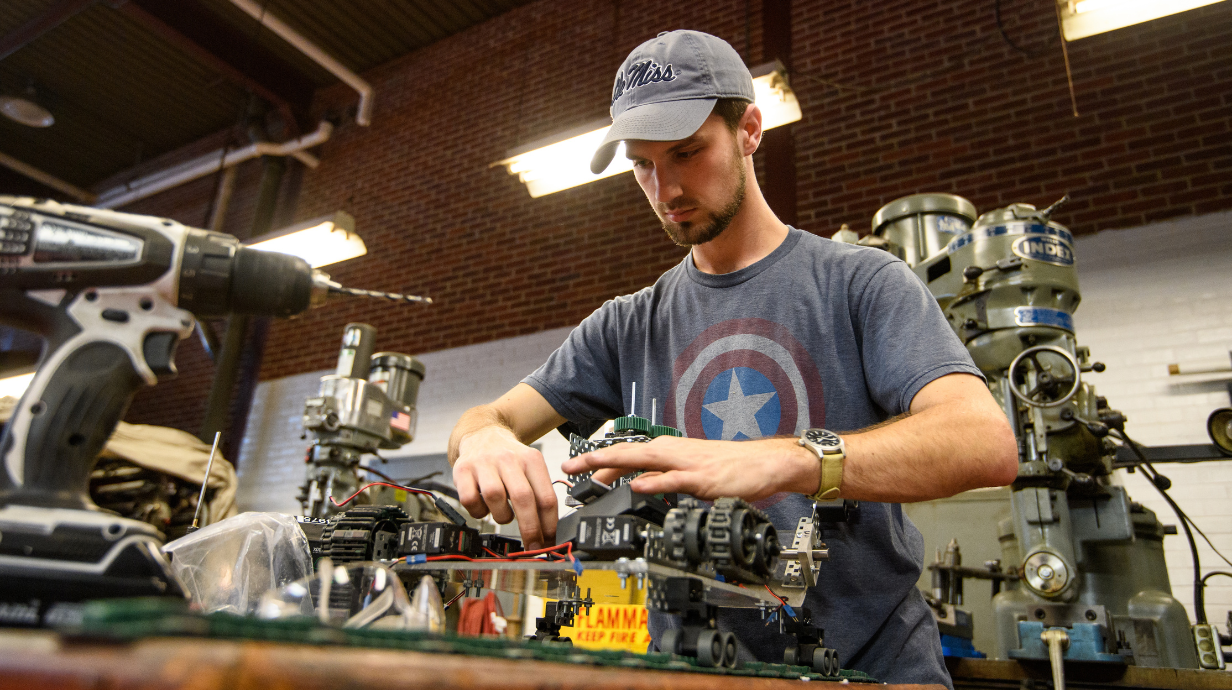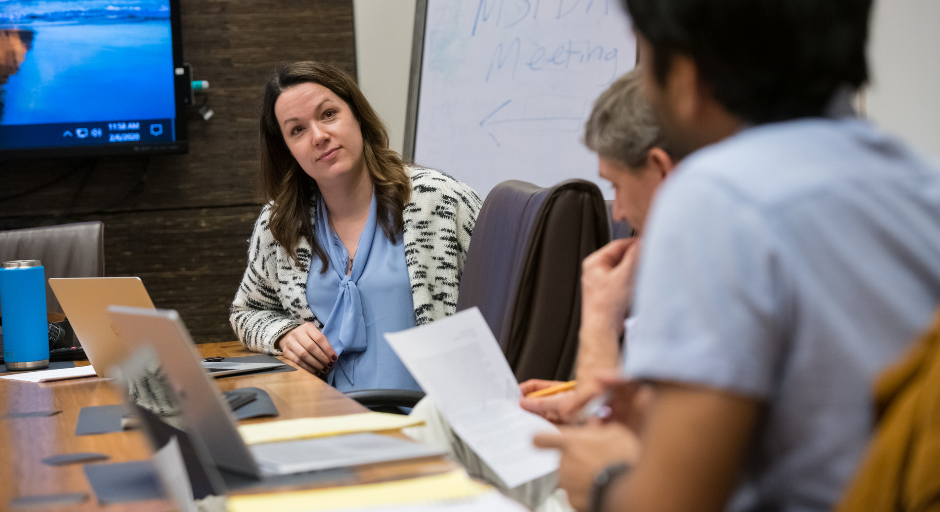For questions about the program intent or process, you may email resdev@olemiss.edu.
Resources for Researchers
ORED can help connect you with resources you can leverage to drive your research forward. Whether you need access to shared instrumentation, expertise, services, or funding opportunities, let us help you find what you’re looking for at the university or beyond.
- Home
- Departmental Directory
- Research and Economic Development
- Resources for Researchers

Connecting Researchers to the Resources That Matter
Your research has the power to drive discovery, solve problems, and create lasting impact—and we're here to help you make it happen.
At ORED, we’re dedicated to advancing your research by providing the services, connections, and expertise you need at every stage of your journey. From securing funding to sharing your findings, our goal is to help your research thrive.
Take Your Research to New Heights
The Fly with the VCRED program will fly you and other UM researchers on the university jet to D.C or other cities to meet with program officers or conduct scholarly site visits. The Vice Chancellor for Research and Economic Development or their designee will accompany travelers on the trip.
Program Officer Visits: Conduct scheduled meetings with program officers at funding agencies to pitch your project ideas and discuss their alignment with current or future funding opportunities.
Scholarly Site Visits: Conduct scholarly research at museums, libraries, archives, or other sites where an advanced appointment is not required.
Full-time employees with long-term appointments in research and scholarly roles who have identified candidate funding opportunity targets or host site can apply at any time to be considered for seats on future flights when they are scheduled periodically throughout the year.
Next Flight Date: There are no flights scheduled at this time.
To apply as a Program Officer Visitor, you must:
- Be a full-time UM employee with a long-term appointment with a research or scholarly role.
- Have attended ORED’s one-hour “Talking to Program Officers” training or completed the online version.
- Have identified the specific funding program and program officer you wish to visit to discuss your concept.
- Have had some interaction with this program officer in the past (phone call, email exchange, feedback on a past proposal, etc.).
- Have drafted a short concept paper summarizing a program or project idea that you wish to seek funding for (see the Concept Paper Note below).
- Have discussed this concept with your chair and associate dean for research (ADR) or dean and received indication that they are supportive if your trip.
- Have an up-to-date researcher faculty profile that highlights your areas of expertise and research interests.
Concept Paper Note: The concept paper is a one- or two-page summary of your proposal idea, using language and/or format customized for the audience. For example, an NIH concept paper make take the form of an NIH-style Specific Aims Statement, whereas an NSF concept paper may take the form of a NSF Project Summary.
If in doubt about what format to use, consult your chair, or your ADR, or ORED Research Development. The draft concept paper does not have to be completely fleshed out, finalized, or polished at the time you submit your application, and ORED Research Development can help you refine it by reviewing and providing feedback on drafts after you apply.
See also: Program Officer Outreach Guidance (a toolkit prepared by Hanover Research for its clients).
Full-time employees with long-term appointments in research and scholarly roles who wish to conduct a scholarly site visit to a museum, library, archive, or other site where an advanced reservation is not required can apply for standby status on a scheduled or to-be-scheduled flight to the D.C. area. If there are still open seats two weeks prior to a scheduled flight, we will seek to fill those seats with individuals on the standby list.
As applications are received, Research Development will vet them for eligibility, completeness, and confirm supervisory endorsement, and offer assistance in editing/polishing the concept paper. Then, as flights are scheduled, we will reach out to vetted applicants in turn and offer them the opportunity to schedule a visit with their program officer on the appointed date. As these appointments are confirmed, seats will be assigned until the flight is full.
Ready to apply?
Collaborate, Write, Propose, or Publish Together with the RED Writing Group
The RED Writing Group program brings together a small cohort of 4–8 UM faculty and staff for an academic-year-long program of mentorship and guided writing. Depending on the year’s focus area, participants may collaborate on a unified research topic using a secondary dataset culminating in peer-reviewed publications, or work in individual or collaborative grant proposals to a common funding opportunity or along a common theme. Each cohort will be led by John C. Higginbotham, Vice Chancellor for Research and Economic Development (ORED), with supplemental support provided by ORED’s Office of Strategic Research Development (SRD).
The 2024-25 cohort developed collaborative proposals using the common dataset from the All of Us research project.
The 2025-26 focus will be developing proposals for the NIH Small Research Grants (R03) or Academic Research Enhancement Awards (AREA) (R15) programs. All RED Writing Group applicants for this cohort should meet the NIH definition of New Investigator at the time of application.

RED Writing Group Application Process
Eligibility varies by cohort year and focus. Applicants for the 2025-26 cohort should:
- Have attended ORED’s one-hour RED Talk on The NIH Specific Aims Statement on 9/8/2025
- Meet the NIH definition of New Investigator
- Have an idea, supported by their chair and ADR, for an NIH R03 or NIH AREA R15 grant
- Commit to:
- Meet at the designated time each month in during the program for instruction and discussion (we will schedule the meetings around the teaching schedules of the selected cohort members)
- Meet regularly with an ORED-designated research developer/advisor to develop a schedule and task list for completing all of the items in their proposal packages
- Participate in supplemental writing workshops facilitated by ORED-SRD
- Participate in enhanced reviews and mock panel reviews facilitated by ORED-SRD
- Complete an R03 or R15 proposal for submission in June 2026
Apply to the RED Writing Group by 9/22/2025
The application will ask for:
- Whether/when you attended (or have registered for) the RED Talk on The Specific Aims Statement (a pre-requisite for cohort participation)
- General info about the applicant (contact info, department, appointment title, etc.)
- Your status as an NIH New Investigator
- Fall 2025 and (if known) Spring 2026 teaching schedules (times you can’t meet)
- A biosketch. An NIH format is preferred, if you don’t have one, we will accept a CV.
- Which opportunity you will pursue (R03 or R15)
- Proposal Idea (your idea for this proposal)
- Prior grant writing experience or other relevant info
After vetting your application for completeness and verifying with your chair and Dean, or ADR, that they support your application, we will select 4 to 8 individuals to participate. Considerations in the selection process are:
- Strength of schedule (the cohort all need to be available at the same time every week with Dr. Higginbotham.)
- Ideal fit for the target focus
- Commitment to complete and submit a R03 or R15 proposal
Resources for Every Stage of Your Research
-
Develop a Compelling NSF CAREER Proposal
ORED wants to help early career STEM faculty develop a compelling proposal to the NSF Faculty Early Career Development Program. Supports include: access to funded NSF CAREER proposals from UM faculty; information sessions and workshops on the NSF CAREER program; templates and checklists; and an annual cohort-style development program that features writing blocks, peer feedback sessions, grantmanship and subject matter expert reviews of proposal narratives, pre-award proposal support, and more.
Funded CAREER proposals Templates and checklists Information session recordings and slides -
Researcher's Toolkit
Access a growing list of resources to help you navigate the various stages of your research—find information on training, award management, hiring research staff, working with collaborators, submitting progress reports, and more.
Explore the Toolkit -
External Funding Opportunities
Explore funding opportunities from federal, state, and private sources to support your research goals.
Find Opportunities -
Internal Funding Opportunities
Discover ORED’s internal funding programs designed to support innovative research and professional growth for faculty and students.
Explore Internal Funding -
Shared Facilities
Leverage cutting-edge instrumentation and shared facilities across campus to advance your research and streamline your work.
View Facilities -
Assessment & Evaluation
Get the support needed to assess your project outcomes and demonstrate the value of your research to funders and stakeholders.
Get Guidance
Research Software
ORED maintains a campus license to Dimensions AI, which UM personnel can access with their WebId and password.
ORED SRD funds a campus-wide site license for the Qualtrics survey platform. Any UM faculty, staff, or student may request free account under the UM Qualtrics domain by following the steps below.
- Go to qualtrics.comand click the “Don’t have an account?” link.
- Enter your @go.olemiss.edu or @olemiss.edu email address and set a password.
- An access code is not needed.
UM Qualtrics Brand Administrator role is performed by the IT Faculty Technology Development Center (FTDC). Please contact the FTDC for account troubleshooting.
Request for ORED Training
ORED staff welcomes the opportunity to work with faculty, research centers, students, and more by offering training on ORED related topics. If you are interested in having a speaker or requesting training, you’ve come to the right place!
Questions? Contact our Team
Jason Hale
- Director of Research Development
Mary Lea McMillan
- Program Manager
John Adam Page
- Research Applications Analyst
Liz Williamson
- Education and Training Specialist III
